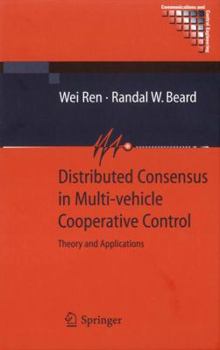Distributed Consensus in Multi-Vehicle Cooperative Control: Theory and Applications
Select Format
Select Condition 
Book Overview
Information consensus guarantees that robot vehicles sharing information over a network topology have a consistent view of information critical to the coordination task. Assuming only neighbor-neighbor interaction between vehicles, this monograph develops distributed consensus strategies designed to ensure that the information states of all vehicles in a network converge to a common value. This approach strengthens the team, minimizing power consumption and the effects of range and other restrictions.
The monograph covers introductory, theoretical and experimental material, featuring - an overview of the use of consensus algorithms in cooperative control; - consensus algorithms in single- and double-integrator, and rigid-body-attitude dynamics; - rendezvous and axial alignment, formation control, deep-space formation flying, fire monitoring and surveillance.
Six appendices cover material drawn from graph, matrix, linear and nonlinear systems theories.
Related Subjects
Computers Computers & Technology Engineering Math Mathematics Science & Math Technology




